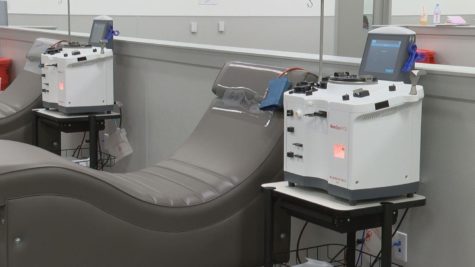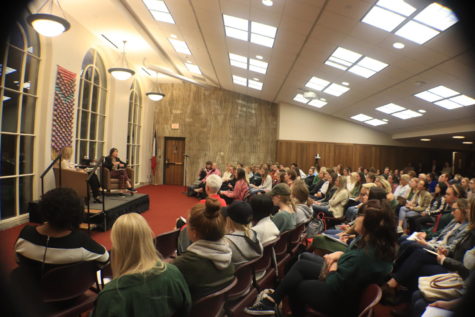Remember to recover
November 12, 2014
The fitness craze in the United States has contributed to many myths that some have bought into — including the idea that in order to truly be physically healthy, one must take no time off from their fitness regimen.
True, incorporating regular physical activity into a lifestyle can have many benefits, including reducing fat, strengthening the heart, improving sleep, decreasing the risk of depression, controlling weight and so much more. What some may not realize, however, are the benefits of also incorporating rest and recovery into an active life.
“So many people are sabotaging themselves because they have a hard time working recovery into their program,” Nora Hudson, program coordinator for Iowa State Recreation Services, said. Below are some suggestions to maximize the recovery process for more effective workouts and long-term physical health.
Nutrition:
“To get the full effect, people should be replenishing their bodies with food within 15 minutes to one hour of an intense workout,” Lauren Millen, junior in food science, recommended. According to the Academy of Nutrition and Dietetics, this meal should include both carbohydrates and proteins. Carbohydrates are used for refueling energy levels in addition to beginning the entire muscle recovery process. Ingesting protein within the allotted time after a workout can also have serious benefits by delivering amino acids needed for muscle repair and synthesis. BodyBuilding.com explained the idea of consuming a 2:1 carbohydrate to protein ratio after a workout. Millen suggested protein powders, cottage cheese, peanut butter, a handful of nuts, eggs or egg whites and turkey for a few protein options after a workout.
“The number-one substance your body should consume, however, is water,” Millen stressed. She mentioned that not staying hydrated is a huge reason for both soreness and a prevented or prolonged recovery process. This is because water helps flush out lactic acid buildup — the substance that gives the feeling of soreness — it keeps the body from being dehydrated, and it also keeps fluids available for transport.
Another suggestion Millen gave was to drink chocolate milk after exercise to help replace sugars lost during the workout.
Rest:
The Better Sleep Council estimated that 70 percent of Americans don’t get enough sleep, while BodyBuildling.com argued that sleep is “the most important part of the recovery cycle.” In a study conducted by Stanford University, nothing was done to a group of athletes except for increasing the amount of time that they slept. After three weeks, improvements were seen all over in their workouts, including faster sprint times, longer endurance and a lower heart rate.
“If someone is sleep deprived, it can prevent the body from repairing itself and fully recovering, and in turn can negatively affect future workouts,” Kensie Noble, senior in kinesiology and president of the Alliance for Health and Fitness Professionals Club, said. Men’s Fitness Magazine explained the imperative of sleep, saying, “In simple terms, when you sleep you recover. When you recover you replace, repair and rebuild — all of which are needed for optimal progress.”
Physically:
“A muscle needs anywhere from 24-48 hours to recover,” Hudson said, “And people do a poor job of letting that happen.” Hudson explained that when the muscles are fatigued, the tissue is vulnerable and without proper recovery there is a risk of a strain or a pull. She suggested, for example, that if someone ran a hard five miles the day before, to consider going for a 30-minute walk that day. Or if someone who lifts weights did a heavy leg workout, they should try to do more upper body exercises the next day to let their legs recover.
“Recovery is really just honoring and trusting the unique physiological process that the body needs to get stronger,” Hudson said.
















